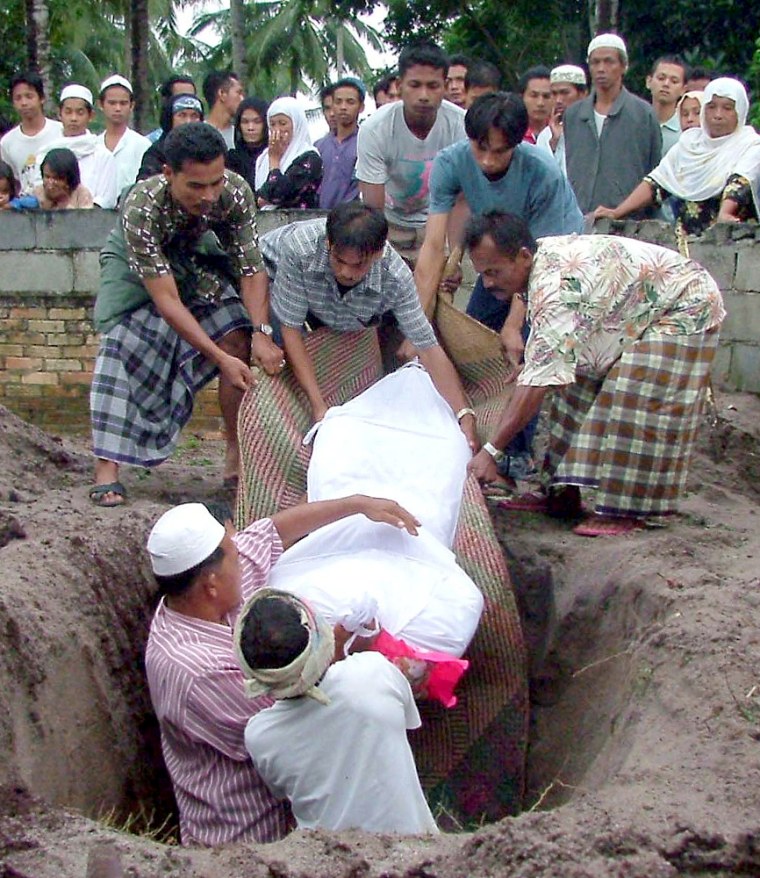Thailand’s prime minister was defiant in the face of mounting anger at home and from his country’s Asian neighbors and the United States about the deaths of scores of Muslims while in army detention after a riot, insisting Wednesday that the military used “the soft approach.”
Seventy-eight people died in detention, and another seven were apparently shot by security forces, bringing the overall death toll to 85.
Grieving relatives of the dead crowded outside an army base in southern Thailand, as outraged Islamic leaders warned the deaths could worsen sectarian violence in the Muslim-dominated south of predominantly Buddhist Thailand.
The victims suffocated or were crushed when hundreds of Muslim protesters were crammed into army trucks for hours. The deaths, during the Islamic holy month of Ramadan, threatened to increase Muslim complaints that they are unfairly treated by the government. The resentment has fueled a revival of a long-simmering insurgency in the south in which more than 400 people have been killed this year.
‘Some mistakes’
In a stormy appearance before the Thai Senate, Prime Minister Thaksin Shinawatra expressed his regrets for the deaths but staunchly defended the military’s actions in Monday’s riot in southern Narathiwat province.
Thaksin sought to partly blame the deaths on the detainees’ weakness from dawn-to-dusk fasting during Ramadan, saying they died of dehydration or suffocation.
The leader acknowledged “there were some mistakes,” including that authorities lacked enough trucks to properly transport the nearly 1,300 people arrested in the unrest because it was a public holiday.
Gen. Sirichai Thunyasiri, commander of a regional task force on security, said detainees spent more than six hours in them before arriving at an army camp in a neighboring province.
Authorities had to “pile them up on top of each other, and they died,” Thaksin said.
“We are sorry for that, sorry they met an untimely death,” he told the Senate. But he insisted the military used “the soft approach” and “did not fire a single round into the crowd.”
However, at least seven other people were killed in the riot, apparently shot by security forces, making the overall death total 85.
A Justice Ministry forensic scientist said most of the victims perished from suffocation and some from dehydration. At least two died suffered broken necks.
Some senators were unconvinced by Thaksin’s explanations. Several yelled at the prime minister as he walked out.
“You have to explain how 78 died while they were in official custody, this case is a severe violation of human rights and damaging to the reputation of the country!” shouted Sen. Kaewsan Atipote.
Criticism from abroad
A Thai Muslim separatist organization, the Pattani United Liberation Organization, warned on its Web site that the fight will be brought to Thailand’s capital, Bangkok. The group, however, is run by aging Muslim exiles, and is not believed to have much of a following on the ground in Thailand.
“Their capital will be burned to the ground like they did to our Pattani capital,” said the group, which is not believed to have much of a following. “Their blood will be shed into the earth and flood into the rivers, our weapons are fire and oil, fire and oil, fire and oil.”
Other Asian nations and the United States criticized Thailand’s handling of the detainees, who were among about 2,000 people clashing with security forces outside a police station while demanding the release of six Muslim suspects.
Malaysian Prime Minister Abdullah Ahmad Badawi said he spoke with Thaksin on Wednesday and urged him to work with Muslim leaders “so that the violence will not continue.”
“I expressed (our concerns) that in the month of Ramadan, incidents of this nature can bring a lot of ... anger and animosity among the members of the community,” Abdullah said.
Indonesia was “concerned by the escalating tension” in Thailand and hoped it could be “resolved in a manner consistent with the Thai government’s commitment to social justice,” a Foreign Ministry spokesman said.
The U.S. Embassy in Thailand said Thai authorities were “responsible for the humane treatment of prisoners.”
“And we urge that the current investigation fully examines the circumstances of these deaths,” it said.
Growing unrest
After subduing the rioters with water cannons and tear gas, Thai police and soldiers kicked the young men and smashed them with rifle butts while forcing them to slither bare-chested across a road to the trucks.
Thailand authorities said some rioters were armed. Twenty pistols, seven assault rifles and three hand grenades were recovered at the scene, Thaksin said.
Hundreds of relatives of the 78 dead wept Wednesday as a police spokesman read out names of the dead outside the Inkayuth-Borihan army camp in Pattani province.
Muslim resident Wadamae Hajehding, 62, traveled to the army camp in hopes of finding out what happened to his 23-year-old son.
Thailand’s security forces were “too cruel,” he said. “They treat us worse than animals.”
Thailand’s stock market tumbled on worries about the growing unrest, with the main index falling by more than 3 percent.
The violence continued Wednesday, as gunmen riding on motorcycles killed one person in Yala province and seriously wounded another four in two separate drive-by shootings in Narathiwat.
The three provinces of Narathiwat, Yala and Pattani were part of the former independent Muslim kingdom of Pattani, annexed by Thailand in 1902.
